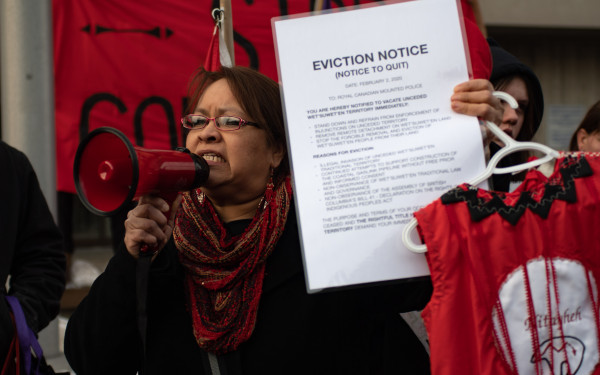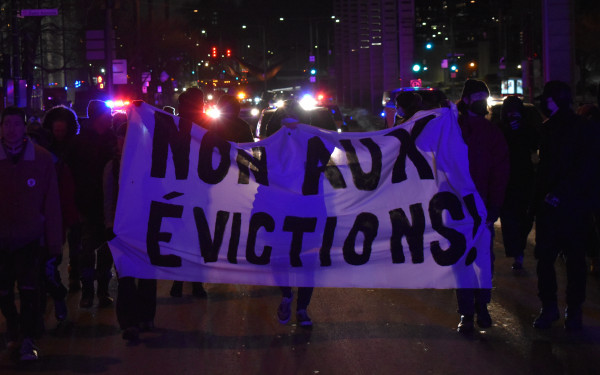RBC: Off Our Campuses
Wet’suwet’en Nation Allies Protest Against RBC Coastal Gaslink Funding
On Nov. 5, approximately 100 protesters protested in front of the McGill University RBC On-Campus bank.
Organized by the Decolonial Solidarity group, participants marched towards the Concordia On-Campus bank where speakers shared their allyship with the Wet’suwet’en nation. Attendants were invited to boycott the bank and to chant in support of the protestors in British Columbia.
On Sept. 18, the Coastal Gaslink pipeline, a project largely protested across Canada for its transgression into unceded Indigenous lands, was ready to begin drilling under the Wedzin Kwa (Morice River). A few days later, the drilling reportedly begun.
This river is a precious source of food and fresh water to the Wet’suwet’en nation. RBC has actively participated in its funding, providing a loan of over six billion dollars to TC Energy Corp, the company overseeing the project.
“You can hear the drill from miles away,” says Henri-François Girard, a member of the Decolonial Solidarity group. “It literally shakes the earth. I feel like we’re in a fantasy novel: the contrast between the generally pacifist people that live there and this gigantic corporation attacking them.”
“RBC continues to fund Coastal Gaslink against the protests of the Wet’suwet’en hereditary chiefs. It’s completely unacceptable.” — Sepi
The Montreal protest was one of many organized simultaneously around the country on the same day. Demonstrations denouncing RBC took place in Toronto, Edmonton, Victoriaville, Ottawa and other cities.
“I am baffled that despite the Canadian Supreme court decisions, despite the British Columbia provincial legislation regarding the environment, despite the United Nations’ Declaration on the Rights of Indigenous Peoples, the RBC continues to fund Coastal Gaslink against the protests of the Wet’suwet’en hereditary chiefs,” said Sepi, a member of the Quit RBC group who also participated in the event. “It’s completely unacceptable.”
According to the Coastal Gaslink website, the project “values the culture, lands and traditions of Indigenous groups” and it shares “strong relationships with local and Indigenous communities.”
“I would like everyone to inform themselves on the difference between elected chiefs and hereditary chiefs, because banks and media use it to confuse people and hide the real stakes,” Sepi said.
Elected chiefs are members of the community that are voted on every two years. This electoral system was put in place by the Indian Act as a way for colonizers to replace the Indigenous system with their own. Their power can only be exercised over the reserve. Hereditary chief positions are passed down through generations following the matriarchal line. The primary duty of the hereditary chief is to protect their territory and their people.
On their way down Guy St., the crowd chanted “Water is life!” and “Solidarité avec les Wet’suwet’en!” Some time after arriving at the Concordia RBC On-Campus bank, more protesters arrived with music equipment to play loud sounds in hopes to disrupt activity inside the bank and discourage passersby from entering.
Emilie Cantin, a protestor and a literature teacher at the Marie-Victorin CÉGEP shared that she has long been touched by the Wet’suwet’en cause.
“I simply responded to a call by the Wet’suwet’en. […] My brother is in Victoriaville right now, protesting as well,” Cantin said.
Over the last three years, protestors in B.C. have organized multiple blockades on the route of the Coastal Gaslink. The results of these protests have been several interventions from the RCMP, including arrests of journalists and demonstrators.
“By doing this, the big capital aims to crush us,” said Cantin. “It’s worth noting that throughout history, everything that has ever changed was the product of passionate, outraged people.”
This article originally appeared in Volume 43, Issue 6, published November 8, 2022.




_600_375_90_s_c1.jpg)


